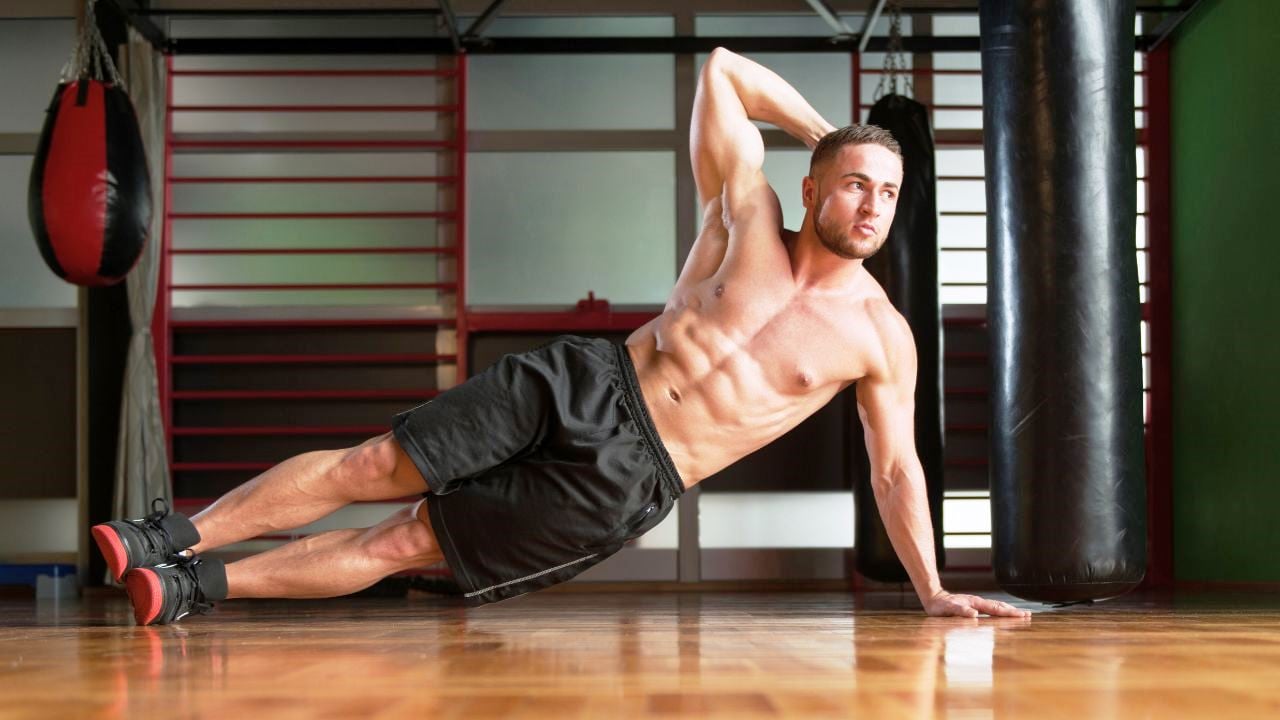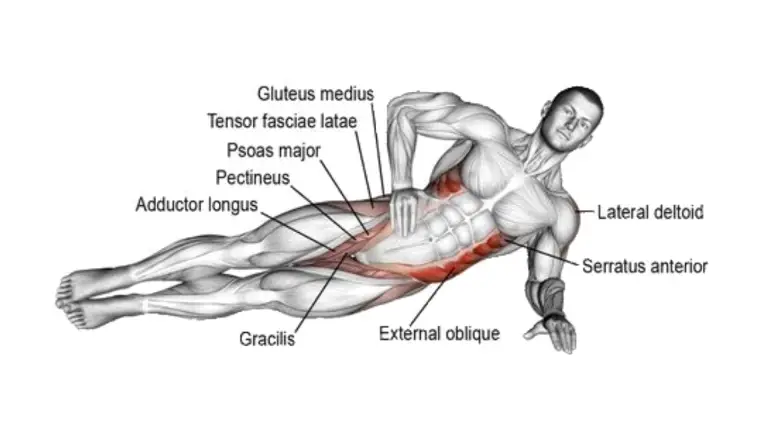The side plank dip, also called the side plank hip lift, is an excellent exercise for strengthening your obliques and outer thighs.
This move starts in a side plank position, where you support your body with one arm and your feet (or knees for a modified version). From there, you lower your hips toward the ground and lift them back up, engaging your core muscles.
Adding a dip to your side plank helps tone your waistline and improves muscle control and posture.
- To make the exercise easier, support your lower body on the side of your knee instead of your foot.
- To make it a challenge, place a weight on your hip to increase resistance and intensity.
Know More Body Fat %: Use Our Free Body Fat Calculator

Side Plank Dip Muscles Worked
The side plank dip is an effective core and stability exercise, engaging a wide range of major muscle groups.
- Primary muscles: Obliques, transverse abdominis (TVA), rectus abdominis, and erector spinae, which provide core strength and spinal stability.
- Secondary muscles: Gluteus medius, hip flexors, and gluteus maximus, which support hip movement and stability.
- Stabilizing muscles: Serratus anterior, deltoids, and trapezius, which help maintain proper shoulder positioning.

How to Do Side Plank Dip
- Lie on your side with your legs extended. Stack your feet on top of each other (or stagger them for better balance).
- Place your free hand on your hip.
- Brace your abs and lift your hips off the floor until you’re balancing on your forearm and feet and your body forms a diagonal line.
- From the side plank position, slowly lower your hip toward the ground. Ensure you don’t let your hip touch the floor.
- Engage your obliques and push your hips back up to the starting position.
- Perform 10–15 reps per side, or as many as possible, while maintaining good form.
- Switch sides and repeat.
Use our free calculator to know your weight loss calories requirement.
Form and Tips
- Ensure your body forms a straight line from your head to your heels. This alignment reduces strain on your lower back and maximizes the engagement of your core muscles.
- Warm up with a full-body loosening exercise before your workout, such as jogging or jumping rope.
- Keep your abdominal muscles tight and breathe regularly throughout the exercise. Do not let your body rotate.
- Use an exercise mat under your arms to increase comfort and stability.
- Avoid resting your hip on the floor at the bottom of the dip.
- A plank dip should be done slowly and controlled, and it can be done daily.
- Squeeze your abs and glutes throughout the movement for stability.
The Benefits of Plank Hip Dips
This exercise improves the strength of your abs, obliques, lower back, and glutes and helps trim your waistline. Several other significant benefits:
- The planking exercise will help you build your core muscles. As you gain strength in your abdominal muscles, your mid-section will tighten.
- The plank dips help reduce back pain because they strengthen your core, which will reduce back pain. They also help strengthen your upper back muscles.
- It is a fantastic balancing exercise that can enhance your sense of balance and coordination, while also helping to improve your posture.
- Planks effectively enhance the strength and flexibility of your posterior muscles. Regularly performing this exercise over time strengthens your core muscles.
- The main advantage of side plank dip is the variety of possible exercises. It is suitable for everyone, regardless of their fitness level.
- This exercise doesn’t require any special equipment and can be performed anywhere.
FAQs
What do side plank dips work?
Side plank hip dips primarily work on the obliques, back, abs, and glute and hip flexors. In addition, the move also works on serratus anterior, traps, and deltoid muscles.
Do side planks strengthen your hips?
Yes, the side plank helps strengthen your hips, but if your main focus is maintaining the hips, you should add side plank hip dips to your workout regime.

Manish is a NASM-certified fitness and nutrition coach with over 10 years of experience in weight lifting and fat loss fitness coaching. He specializes in gym-based training and has a lot of knowledge about exercise, lifting technique, biomechanics, and more.
Through “Fit Life Regime,” he generously shares the insights he’s gained over a decade in the field. His goal is to equip others with the knowledge to start their own fitness journey.
